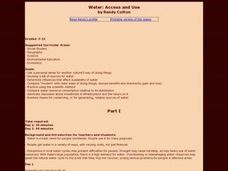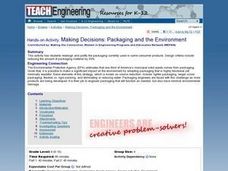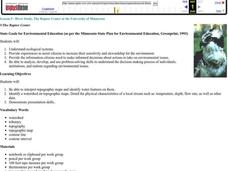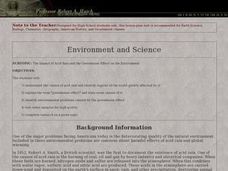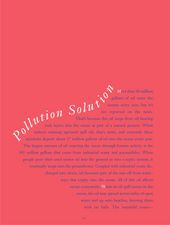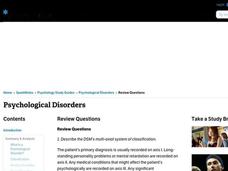Curated OER
3-D Model of Lake Benthos
Students create 3-D models of Lake Benthos. In this scale drawing lesson, students create a 3-D model of Lake Benthos. Students work in groups to create the models. Students use the models to to encourage people to conserve natural...
Curated OER
Fishing for Solutions
Students investigate the many ecological and economic issues related to over fishing the world's marine resources. Working in committees, students research the related topics of equipment and fishing techniques.
Curated OER
Hazardous Waste Issues in the News
Learners work together to research hazardous waste in the news. They discover how large the hazardous waste issue is. They complete an experiment and discuss how the issues affect their community.
Curated OER
Pollution Prevention
Young scholars examine pollution and what causes it. They discover ways to reduce pollution and how to prevent it in the future.
Curated OER
Hazardous Waste Cleanup Methods
Students examine how hazardous wastes are cleaned up. They work together to identify the positives and negatives of cleaning up certain hazardous wastes. They answer questions as part of the activity.
Curated OER
Water: Access and Use
Young scholars get a personal sense for another culture's way of doing things. Develop a list of sources for water. Practice using the scientific method. Examine means for conserving, or for generating, reliable sources of water.
Curated OER
Radon Gas in the Basement: A Radiation Hazard
In this radon gas worksheet, students read about the harmful effects of radon exposure over time. They use a map that shows radon gas zones to answer 3 questions about exposure to the gas and the amount of radiation that humans get from...
Curated OER
Making Decisions: Packaging and the Environment
Students work in small groups to redesign the packaging of several common items. They attempt to reach the goal of 25% reduction in packaging materials currently used and explore the impact of various materials and designs in landfills...
Curated OER
Identifying Risks at a Superfund Site
Young scholars work together to discover the type of risks at Superfund sites. They examine how sites are found and where to report hazardous sites. They evaluate the activities of the government to protect its citizens.
Curated OER
World in the Balance
Learners make estimates on how many people they believe live on Earth. While watching a video, they take notes on the issues facing Kenya, Japan and India. In groups, they calculate how long it takes for a country to double in size. To...
Curated OER
Avoiding Carbon Dioxide Emissions from Burning Fossil Fuels
Students calculate stoichiometrically the amount of carbon dioxide that would be emitted from burning a mole of varios alkanes that comprise fossile fuels. If the energy released from burning a mole of these alkanes is known, then the...
Curated OER
How to Teach Students about Acid and Acid Rain
How acidic is your rainwater? Use these lesson plans to get students thinking about how acids affect the environment in which we live.
Curated OER
The Role of the Government in Lead Poisoning Prevention
High schoolers examine a general overview of the issues around lead poisoning in order to become more aware of the dangers and effects it has on the human body. They investigate how and why various government agencies and laws were...
Curated OER
Science Happens in a Social Context
Students discuss how the same data is viewed differently between historians and scientists. Using the data, they compare and contrast the vocabulary used and the focus of attention. They analyze the conditions that help spread diseases...
Curated OER
Wetland Wonders
Students study the characteristics of wetlands, and their importance to humans and wildlife.
Curated OER
River Study
Students explore a stream in their area and show the class the topographic map of the stream. They locate the topographic map and name the streams, lakes and ponds in their watershed. They write a paragraph about their stream and...
Curated OER
Recycling by Composting
Students examine the idea of recycling by composting. Using the internet, they research the benefits of composting to the environment. In groups, they collect numbers on how much food and yard waste is produced in their community. ...
Curated OER
It's Not Easy Being Green
Students complete a unit that focuses on their school's waste production. They conduct a litter survey, collect the waste produced in their classroom for a week and generate a waste-audit, and identify how their school can minimize...
Curated OER
Rainforests of Madagascar: Role Playing and Decision Making
High schoolers examine reasons for deforestation and become familiar with Madagascar and its culture, while describing biological and abiotic components of a rainforest, and looking at aspects that must be addressed to resolve the issue...
Curated OER
Sample Activity From The Water Sourcebook
Students explore septic system failures and contamination of groundwater. The complete a worksheet to explore the basic parts of a septic system. In a lab situation, students simulate a septic system failure. They explore coliform...
Curated OER
Children's Health
Students learn the basic parts of an insect, where they like to hide indoors, and how to safely get rid of them. They assemble the cockroach body and cut it out of a brown bag. They attach pipe cleaners as legs and attennae. They then...
Curated OER
The Impact of Acid Rain and the Greenhouse Effect on the Environment
Students study acid rain and complete several activities that show how it affects the environment. They role play members of the community involved in a major decision involving the protection of the environment.
Curated OER
Pollution Solution!
Students listen to the story "Clean Air, Dirty Air" by Lynne Patchett and discover the main types of pollution and how these affect their bodies. In this pollution lesson plan, students work in small groups to create a machine to prevent...
Curated OER
Psychological Disorders
For this psychology worksheet, students complete 5 short answer questions on pscyhological disorders. They identify characteristics of have certain disorders.







